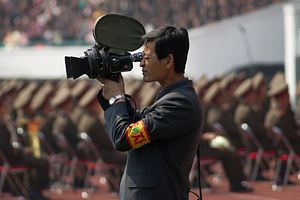When 13 North Korean restaurant workers in China defected to South Korea earlier this month, they instantly became players in a propaganda war that has raged for decades across the 38th parallel.
Seoul, usually reticent about individual defections, hailed the arrival of a dozen waitresses and their manager as proof that tough new sanctions were putting the squeeze on Pyongyang’s network of overseas restaurants. With the announcement coming just days ahead of parliamentary elections, journalists and pundits publicly wondered if the government was trying to sweeten the public mood.
Pyongyang fired back with the claim that there had been no defection at all, but an abduction by South Korean security services. On Thursday, the regime invited CNN to a hotel in Pyongyang to witness a piece of emotional theater involving seven tearful waitresses from the same restaurant in Ningbo city, Zhejiang province, where the defectors had worked. Between dutiful sobs, they claimed their colleagues had been tricked by their manager, who was working in cahoots with the South.
“I think about our colleagues being deceived and dragged to South Korea and facing extreme hardship there,” said Han Yun Hui, according to CNN. “It tears our hearts.”
No convincing explanation was offered for how the supposed abductees had been “dragged” out of China against their will if they went through legal immigration channels, as confirmed by Beijing.
On the same day, Pyongyang’s Red Cross Society proposed a meeting between the apparent defectors and their families back home, a suggestion immediately rejected by the South. Seoul has insisted that the workers left China entirely of their own accord and that they were accepted out of humanitarian concern.
Whether or not the exact details of their arrival in the South are ever made known, the two Koreas have been transparent in using the workers as weapons in their ongoing battle for legitimacy.
Neither side, however, seems to have much to show for its efforts. In the April 13 vote, South Korea’s ruling Saenuri Party lost its parliamentary majority.
“The ROK (Republic of Korea) electorate and media are more savvy than that; they saw right through it,” Daniel Pinkston, a professor at Troy University and former Korean linguist with the U.S. Air Force, told The Diplomat. “I would bet [the defections] had absolutely no impact on the electoral outcome at all.”
For Pyongyang, meanwhile, a mass defection would be seen as a major embarrassment, especially coming just weeks ahead of the 7th Congress of the Workers’ Party of Korea, the first such meeting in more than three decades.
Pinkston said Pyongyang had no choice but offer its own explanation, however unlikely. “Given the types of people the defectors were, so-called elite or middle class in Pyongyang, their families and people in Pyongyang were finding out about it since it was all over the news,” he said.
“So the North Korean government had to have a story or answer and the story they have issued is what they have to say in their circumstance. Even if it’s not true, of course they have to say that.”

































